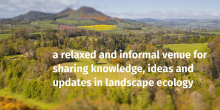
In the first Landscape Connections webinar of 2024, we will be focusing on the topic of Local Nature Recovery Strategies (LNRS). Local Authorities in England are now required to produce a LNRS, and similar policies are in place in other UK nations. LNRS is the latest policy in a long history of attempts to coordinate nature conservation efforts, with proclaimed improvements in stakeholder consultation and governance.
We will be joined by three speakers who approach LNRS from different perspectives for talks and discussion on the involvement of various actors in the LNRS process. The webinar will be Monday 8th April, 15:00-16:30 BST. Register now here.
Introduction: Our Nature
Rosie Whicheloe from the London Borough of Sutton will take a very short philosophical view of the LNRS process, taken from her experience in Sutton, Hackney, Newham and Croydon.
Tom Butterworth, ARUP
BAPs, BOAs and biodiversity: A brief history of biodiversity strategies in SE England - We will move from global ambitions to national strategies, through regional planning to local delivery, identifying how this has changed over time and what we can learn from the previous work to inform the Local Nature Recovery Strategies. All with the aim of restoring nature and building bigger, better and more joined ecological networks.
Geoffrey Griffiths, University of Reading
Local Nature Recovery Planning: A parish-based approach - The Defra initiative to develop Local Nature Recovery Strategies (LNRS) at county level across England, will require local input if the process is not to be ‘top-down’ with limited consideration of community views and local knowledge. In West Oxfordshire, a parish cluster is developing a volunteer-driven Nature Recovery Plan (NRP), involving mapping ‘natural assets’ and ‘natural capital,’ as a baseline to identify opportunities for habitat restoration/expansion and long-term monitoring. The NRP will provide an exemplar for other parishes in the county and, perhaps in the longer-term, for the almost 11,000 parishes in England – a big challenge!
Gideon Corby, Wildlife Gardeners of Haggerston
Hackney Local Nature Recovery Strategy in action - When urban landowners do not see the potential of their green and blue space it is possible to introduce ecological enhancements at the local level, using local knowledge to improve large areas, bottom-up. However, even if these enhancements are by agreement, they remain vulnerable if the landowner has a change in personnel or policy. A look at two examples: Kingsland Basin and the Old Lea, and the development of strategies to defend and fund ecological works by community volunteer group, the Wildlife Gardeners of Haggerston.
Contact: if you have any questions, please contact Early Career Representative Caitlin Lewis on students@iale.uk
Information on past and future webinars in the Landscape Connections series can be found here.